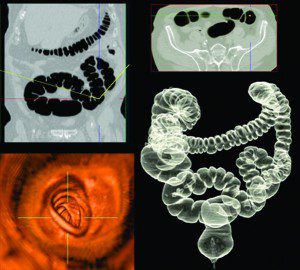 The American Cancer Society added CT Colonography (or Virtual Colonoscopy) to the list of recommended colon cancer screening and prevention tests in March 2008. According to those guidelines, men and women at average risk for developing colorectal cancer should start screening for colorectal cancer at age 50, or earlier depending on medical and family history. The ACS now considers this as a “preferred” test that “finds polyps and cancer” and recommend it be performed every five years.
The American Cancer Society added CT Colonography (or Virtual Colonoscopy) to the list of recommended colon cancer screening and prevention tests in March 2008. According to those guidelines, men and women at average risk for developing colorectal cancer should start screening for colorectal cancer at age 50, or earlier depending on medical and family history. The ACS now considers this as a “preferred” test that “finds polyps and cancer” and recommend it be performed every five years.
What is a Virtual Colonoscopy?
Virtual Colonoscopy is a non-invasive, highly accurate test that allows doctors to look at the large bowel (colon) to detect polyps and cancers in the early stages. It is a screening technique that uses a CT scanner and computer graphic software to produce images of the colon through which the radiologist can “navigate.”
Why should I get a Virtual Colonoscopy?
Colorectal Cancer is one of the leading causes of cancer death in the United States. Each year, about 150,000 Americans are diagnosed with colorectal cancer, and more than 50,000 die from it. In many cases colorectal cancer can be prevented. Colorectal cancer almost always starts with a small growth called a polyp. If the polyp is found early, doctors can remove it and stop colorectal cancer before it starts. If it’s found and treated early (while it’s small and before it has spread), the 5-year survival rate is about 90%. But because many people are not getting tested, only about 4 out of 10 are diagnosed at this early stage when treatment is most likely to be successful.
Who should have a colorectal screening?
The American Cancer Society recommends patients seek colorectal cancer screening as early as age 50 and every 3-5 years thereafter. Patients with a strong family history of colorectal cancer or polyps should be screened more often.
What are the symptoms of colorectal cancer?
Some symptoms of colorectal cancer include:
• Change in bowel habits such as diarrhea or constipation
• Rectal bleeding or blood in the stool
• Cramping or abdominal pain
• Decreased appetite
• Weakness and fatigue
• Jaundice (yellow-green discoloration of skin and white part of the eyes)
What is conventional Colonoscopy?
In conventional Colonoscopy, a long thin scope is inserted into the colon. This procedure typically uses sedation for the patient’s comfort. A tiny camera in the scope transmits images of the colon to a monitor for the doctor to review. The total procedure time is 30-60 minutes.
Virtual Colonoscopy vs. Conventional Colonoscopy
Virtual Colonoscopy does not require a colon scope or sedation. Virtual Colonoscopy also takes less time than a conventional Colonoscopy. Another advantage of Virtual Colonoscopy is that other organs can also be screened for abnormalities.
Sometimes conventional Colonoscopy may result in an incomplete exam due to bowel obstructions. There is a slightly greater chance of having a complete exam with a Virtual Colonoscopy. Unlike the conventional exam, the radiologist cannot take tissue samples or remove polyps during a Virtual Colonoscopy. A conventional Colonoscopy may be needed to investigate abnormalities discovered on the exam.
What is the preparation for a Virtual Colonoscopy?
This procedure requires oral preparations to clear stool from your colon. An oral contrast medium is also taken the day prior to your scan. After the scan, you can immediately return to your normal routine.
What does the Virtual Colonoscopy procedure involve?
The procedure will begin by having air introduced into the colon through a small enema tip. This allows distention of the colon to enable the CT scanner to take detailed 3D images. The procedure requires you to lie comfortably on the scanning table first on your back and then on your stomach.
Is it painful or uncomfortable?
When air is introduced into the colon some patients may experience temporary abdominal
cramping or “gas pains.”
How long will I have to wait for the results?
After your exam, a board-certified radiologist will review your CT images. As with other procedures offered at Radiology Regional Center, confidential reports will be generated and mailed to you within three business days. In the event of a positive test, the report will be sent to your referring physician at your request.
Why should I go to Radiology
Regional Center for this exam?
Radiology Regional Center has been providing high-quality diagnostic services in Southwest Florida for over 35 years. The Center is owned and operated by an innovative and devoted group of board-certi-
fied radiologists educated at distinguished institutions such as Duke, Harvard and Mount Sinai.
The skills required to interpret virtual studies are different from those required for conventional Colonoscopy. Virtual Colonoscopy requires a radiologist trained in reconstructing and interpreting the images from the CT scanner.
Radiology Regional Center
(239) 936-4068
radiologyregional.com










